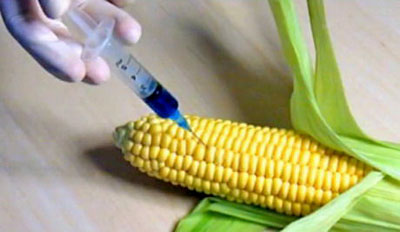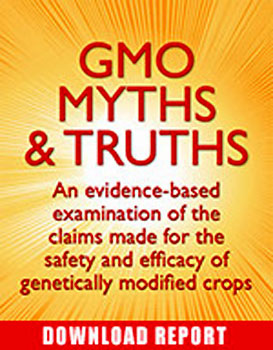|

by Anne Sewell
July 5, 2012
from
DigitalJournal Website

In a groundbreaking report, two genetic engineers explain in detail
why GMOs are not good for human health or the environment.
The new report has been released today, July 5, and is titled “GMO
Myths and Truths”.
The report presents a large body of peer-reviewed scientific and
other authoritative evidence of the hazards to health and the
environment posed by genetically engineered crops and organisms
(GMOs).
While there are many
campaigners against GMOs in
general, the initiative for this report came not from campaigners,
but from two genetic engineers, who believe there are good
scientific reasons to be wary of GM crops and food.
One of the genetic engineers involved in the report is Dr
Michael Antoniou of King’s
College London School of Medicine in the U.K., which uses genetic
engineering for medical applications but warns against its use in
developing crops for human food and animal feed.
Dr Antoniou said:
“GM crops are promoted on the basis
of ambitious claims - that they are safe to eat, environmentally
beneficial, increase yields, reduce reliance on pesticides, and
can help solve world hunger."
“I felt what was needed was a collation of the evidence that
addresses the technology from a scientific point of view."
“Research studies show that genetically modified crops have
harmful effects on laboratory animals in feeding trials and on
the environment during cultivation. They have increased the use
of pesticides and have failed to increase yields. Our report
concludes that there are safer and more effective alternatives
to meeting the world’s food needs.”
The second author of the report is Dr
John Fagan, a former genetic
engineer, who in 1994 returned $614,000 in grant money to the
National Institutes of Health, due to concerns about the safety and
ethics of the technology.
Dr Fagan then founded a GMO testing
company.
He says,
“Crop genetic engineering as
practiced today is a crude, imprecise, and outmoded technology.
It can create unexpected toxins or allergens in foods and affect
their nutritional value. Recent advances point to better ways of
using our knowledge of genomics to improve food crops, that do
not involve GM."
“Over 75% of all GM crops are engineered to tolerate being
sprayed with herbicide. This has led to the spread of
herbicide-resistant superweeds and has resulted in massively
increased exposure of farmers and communities to these toxic
chemicals. Epidemiological studies suggest a link between
herbicide use and birth defects and cancer."
“These findings fundamentally challenge the utility and safety
of GM crops, but the biotech industry uses its influence to
block research by independent scientists and uses its powerful
PR machine to discredit independent scientists whose findings
challenge this approach.”
The third author of the report is
Claire Robinson, who is research director of
Earth Open Source.
Robinson said,
“The GM industry is trying to change
our food supply in far-reaching and potentially dangerous ways.
We all need to inform ourselves about what is going on and
ensure that we - not biotechnology companies - keep control of
our food system and crop seeds.
“We hope our report will contribute to a broader understanding
of GM crops and the sustainable alternatives that are already
working successfully for farmers and communities."
An extract from the report reads:
Genetically modified (GM) crops are
promoted on the basis of a range of far-reaching claims from the
GM crop industry and its supporters. They say that GM crops:
-
Are an extension of natural
breeding and do not pose different risks from naturally
bred crops
-
Are safe to eat and can be
more nutritious than naturally bred crops
-
Are strictly regulated for
safety
-
Increase crop yields
-
Reduce pesticide use
-
Benefit farmers and make
their lives easier
-
Bring economic benefits
-
Benefit the environment
-
Can help solve problems
caused by climate change
-
Reduce energy use
-
Will help feed the world
However, a large and growing body of
scientific and other authoritative evidence shows that these
claims are not true. On the contrary, evidence presented in this
report indicates that GM crops:
-
Are laboratory-made, using
technology that is totally different from natural
breeding methods, and pose different risks from non-GM
crops
-
Can be toxic, allergenic or
less nutritious than their natural counterparts
-
Are not adequately regulated
to ensure safety
-
Do not increase yield
potential
-
Do not reduce pesticide use
but increase it
-
Create serious problems for
farmers, including herbicide-tolerant “superweeds”,
compromised soil quality, and increased disease
susceptibility in crops
-
Have mixed economic effects
-
Harm soil quality, disrupt
ecosystems, and reduce biodiversity
-
Do not offer effective
solutions to climate change
-
Are as energy-hungry as any
other chemically-farmed crops
-
Cannot solve the problem of
world hunger but distract from its real causes -
poverty, lack of access to food and, increasingly, lack
of access to land to grow it on.
Based on the evidence presented in this
report, there is no need to take risks with GM crops when effective,
readily available, and sustainable solutions to the problems that GM
technology is claimed to address already exist.
Conventional plant breeding, in some
cases helped by safe modern technologies like gene mapping and
marker assisted selection, continues to outperform GM in producing
high-yield, drought-tolerant, and pest- and disease-resistant crops
that can meet our present and future food needs.

|


